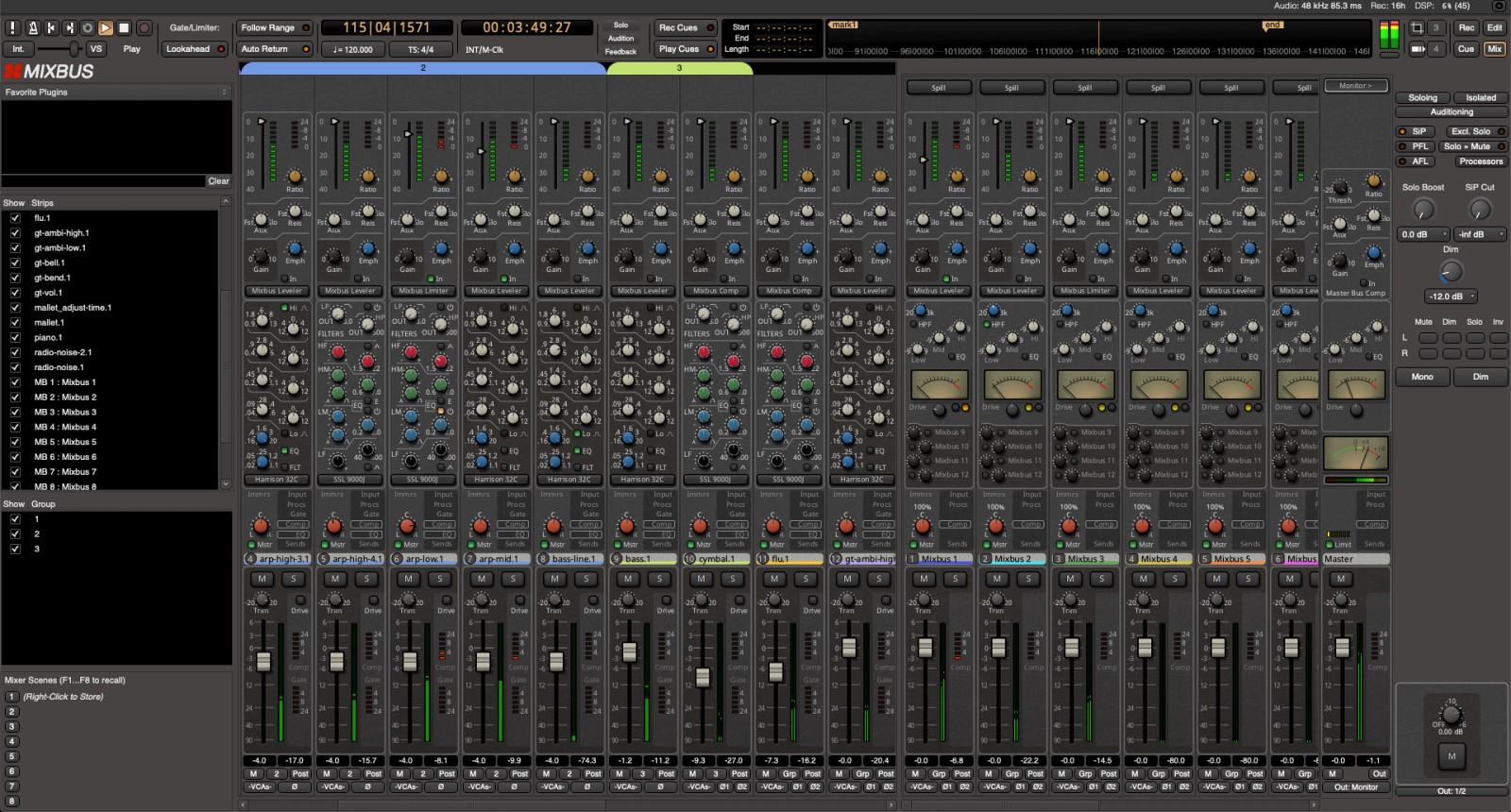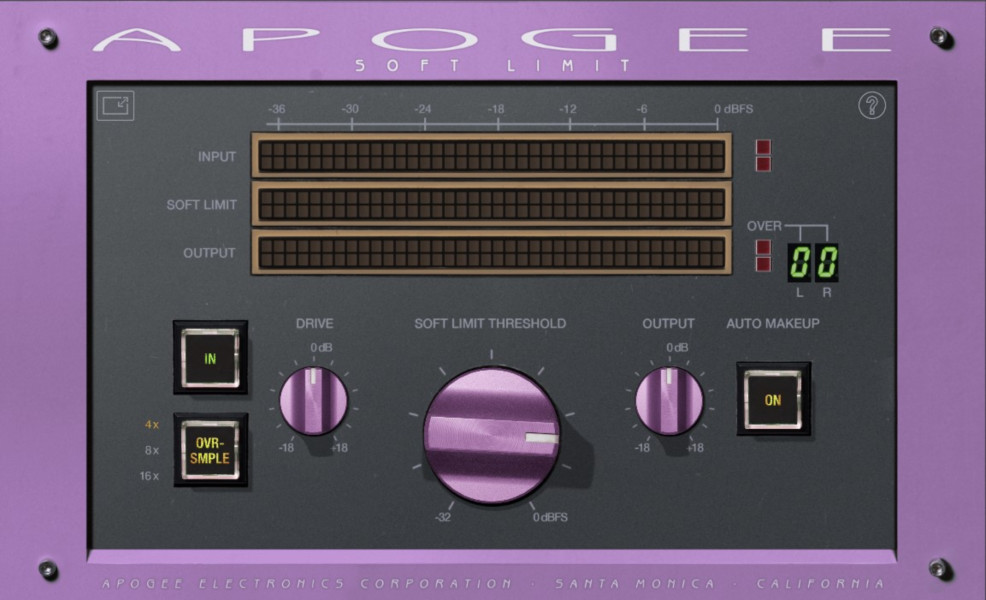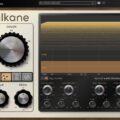Harrison Mixbus 10 has been released. Harrison has been consistently releasing major updates almost every year, but this 10th version update has garnered more attention. This is due to the addition of the SSL 9000J console EQ and support for Dolby Atmos functionality.
Contents
My Thoughts on Mixbus
I have been using Mixbus since version 5. The greatest strength of Mixbus is undoubtedly its analog console-style workflow.
One of the great things about console workflow is the ability to "see the forest without looking at the trees." Often, when mixing in a DAW, one can get caught up in the sound design of individual instruments and tracks, which can disrupt the overall balance. Mixbus, with its ability to handle faders, EQs, and compressors for all tracks on one screen, is great for hearing the entire sound and making immediate adjustments as needed.

Another attraction for me was the ability to set bus channel routing with a single click, immediately change send signal levels, and switch between Leveler, Compressor, and Limiter compressor modes with just one button.


Saturation is also a special feature of this DAW. While other DAWs typically require separate plugins for emulation of analog saturation, Mixbus allows you to do that with just one Drive button and knob.
With built-in EQ, compressor, and tape emulation in Mixbus, the only third-party plugins I needed for mixing were just dynamic EQ, reverb, and delay etc. And This could easily be covered by Harrison's ACE, XT, and AVA plugins.
What's New in Mixbus 10
All Mixbus Upgraded to 32C
The previous distinction between Mixbus v(Number) and Mixbus 32C v(Number) has been replaced by Mixbus 10/Mixbus 10 Plus/Mixbus 10 Pro.
Priced at $129.99, Mixbus 10 inherits the features of the previous Mixbus regular version but is upgraded with 32C EQ functionality and more.
Mixbus 10 Plus, priced similar to the previous 32C version ($349.99), adds gate functionality to all channel strips and includes 19 Harrison XT plugins.
Mixbus 10 Pro, priced at $499.99, includes SSL 9000J EQ and Dolby Atmos functionality in addition to the features of the previous 32C version.
SSL 9000 EQ
Solid State Logic (SSL) acquired Harrison last April. Since then, there have been collaborations such as sale combining SSL Native plugins with Harrison's XT and AVA plugins. Mixbus 10 sees a meaningful collaboration with the introduction of SSL EQ.

Mixbus 10 allows you to use Harrison 32C EQ and SSL 9000J EQ on all tracks' channel strips, but this is only available in the Pro version or higher.
Dolby Atmos Functionality
Checking the Session > Immersive Panning option in the menu activates 3D panning on all channel strips. An Immersive Master Bus is also created on the master channel. However, CPU usage increases.


Mixbus 10 enables 7.1.4 speaker monitoring and mixing via built-in binaural rendering, and surround mix simulation is possible on headphones as well. However, Dolby Atmos functionality is only available in the Pro version.
Other noticeable improvements were ability to specify sends as Pre Fader, allowing for more diverse signal routing.

Positive Aspects
The most commendable aspect of Harrison Mixbus is its consistent evolution through updates.
As a user since Mixbus v5, I've seen many changes in Mixbus over time. Features like being able to adjust attack and release in all three compressor modes, additions to saturation types, improvements in EQ functionality were cool. And the drawback such as lack of VST3 support is no longer.
There were certainly elements in this 10th version update that caught consumers' attention. The upgrade of all Mixbus versions to 32C consoles is a welcome development. Additionally, the future collaborations with SSL are promising.

Negative Aspects
However, the most significant updates, namely SSL EQ and Dolby Atmos support, are only available in the Pro version, ultimately leading to an increase in the overall price.
While existing Mixbus users may have received discount codes via email, and compared to other popular DAWs, the price increase isn't overwhelmingly high, it may still present a somewhat high barrier to entry for new users.
Moreover, one cannot ignore the persistent issues with Mixbus. Mixbus still feels somewhat sluggish, which is one reason, whether voluntary or involuntary, that users tend to reduce their usage of third-party plugins.
Clear Advantages and Disadvantages
In conclusion, Mixbus has clear strengths. It combines analog workflow with the advantages of digital software effectively. The built-in EQ, compressor, and saturation performance are excellent, and the interface becomes convenient once you're familiar with it.


However, like many users, I mainly use Mixbus for summing or mixing/mastering purposes. It seems that Mixbus is not typically used as the primary DAW for composition, recording, editing, etc.
DAWs with such specialization seem to be losing ground. From what I've observed, I cautiously predict that the music software market is moving towards consolidation under one company or one plugin subscription service.
In that regard, it seems that Harrison, along with SSL, is pioneering another path. Just as Universal Audio's LUNA and UAD plugins are combined, I look forward to the situation where Mixbus DAW and SSL Native plugins are combined someday.
This article was published in partnership with Monthly Mixing.




